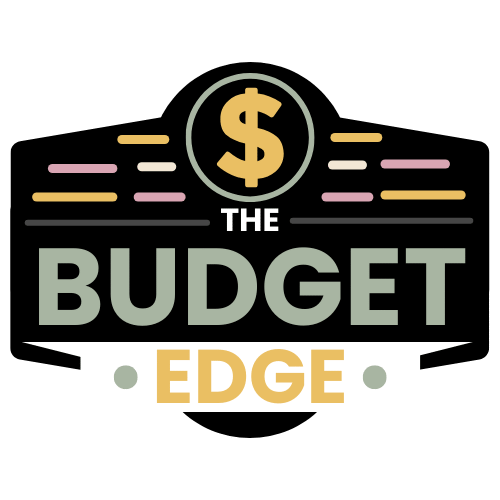
What My Childhood Taught Me (& Didn’t) About Money

The Things I Wish I Knew
Like many of us, growing up I never really understood how money worked. I just knew we never seemed to have enough of it.
We weren’t poor by definition. My mom worked full-time, and she worked hard. We lived in a lower to middle class neighborhood, I went to a decent public school. On the surface, things looked okay – but behind closed doors, money was always tight.
Despite her steady income, we lived paycheck-to-paycheck. Family vacations were unheard of. Back-to-school shopping wasn’t exciting and filled with name-brand clothes and shoes. We didn’t eat out frequently, and we didn’t buy new things unless they were necessary – and even then, it felt like a stretch.
To be clear: none of it was her fault. She did everything she could to make a good life for us. She showed up every day, worked long hours and provided a stability in the only way she knew how. The struggles we faced didn’t start with her – they were generational. She did the best with what she had and what she’d been taught.
Looking back at my childhood, I don’t think it was about how much money we had. It was about how it was managed – or not managed. And unfortunately, no one had shown her how to do that either.
What My Childhood Did Teach Me About Money
Even though budgeting wasn’t part of our family conversations, I still was able to absorb a few lessons about money just by living through the struggle. Some were painful lessons, but they all stuck with me into adulthood.
1. How to Stretch a Dollar
One thing about living a childhood where money is fleeting, is learning how to make things last. Whether it was clothes, food or household items – we used it to its full useful life. Nothing was wasted and making do sometimes became second nature.
2. That Hard Work is Non-Negotiable
Watching my mom hustle every single day taught me a huge lesson: if you want something, you have to work for it. She didn’t give up when it got hard. That work ethic, which she still carries through to this day, became one of the most valuable lessons I carried into adulthood.
I wanted a new car; so I got a second job. If I wanted to splurge on something for myself; I saved extra money here and there until I had enough put away to get it.
3. That You Can’t Always Afford What You Want – And That’s Okay
I want to start this piece by saying, I might spoil my kids a little bit now 😬 but not all the time, and they certainly don’t get everything they want. We didn’t have the latest fashions or the most high-tech gadgets growing up. And while I didn’t always understand why at the time, it did teach me to appreciate the value of patience – and to prioritize needs over wants – as an adult.
4. That Money Can Be Emotional
No one ever said it out loud, but as a child I could tell that money was sometimes tied to stress, guilt and maybe even a little shame. I learned that finances affect your mood, relationships and even the energy in a room. That lesson stuck with me more than I may have liked and still find myself feeling certain emotions when I work on our budget, or plan for a big expense.
These lessons weren’t easy, but they did shape how I think about money today. And even though I didn’t grow up with financial clarity, I did however grow up with a resiliency and creativity that allowed me to survive with less and come up with new ways to save and earn the things I want.
-

Sinking Funds & Why You Absolutely Need It
What is a Sinking Fund & Why You Absolutely Need One in Your Budget Have you ever been sidelined by a big expense that completely wrecked…
-

Budgeting on an Irregular Income
How We Budget on an Irregular Income If your income changes on a weekly or monthly basis, you’re not alone – and yes you can still…
-

What My Childhood Taught Me (& Didn’t) About Money
The Things I Wish I Knew Like many of us, growing up I never really understood how money worked. I just knew we never seemed to…
-

Before the Budget: The Shift That Changed Everything
The Moment I Knew We Needed a Plan I don’t remember every detail of the moments – or the life – before the budget. But I…
What My Childhood Didn’t Teach Me About Money
As valuable as some of the lessons I did learn were, I grew to learn there were major gaps in my financial education – things I didn’t even know were missing until later in adulthood. When I was forced to figure them out the hard way.
1. How to Budget
Not a single person in my childhood sat down with me and showed me how to come up with a plan for my money. I didn’t know what a monthly budget looked like, or that you should assign every dollar a “job.” So, when I started making my own money, I did what I saw growing up: I spent what I had, hoped it would stretch as long as I needed it to, and felt guilty when it didn’t.
In a later post, I’ll go over how to help your kids set up their own budget, even if all they get is a weekly allowance. Thus, setting the framework for healthy money conversations, and financial literacy at a young age.
2. How to Save with Purpose
As far as I am aware, we weren’t saving for long-term goals like vacations or emergencies. If my mom did, it wasn’t visible or talked about. And because of this, I never learned how to build a savings over time, or how important it is to prepare for the unexpected expenses. My savings habits, until very recently, were nonexistent or came out of panic, not control.
3. How to Use Credit Wisely
Here’s the big one. Credit cards and loans were a total mystery to me. I didn’t understand how interest worked, or how missing payments could haunt you for years. Like many people, I learned about credit by burying myself in a hole first.
4. How to Set Financial Goals
As a teen, and young adult, I knew I wanted to own my own home, but I didn’t know how I would ever get there. This is because no one ever talked about goals like buying a home, retiring or building wealth. Money was short-term growing up – getting through this week, or this crisis. The idea that money could be used to build something, that came much later.
5. That Money Can Be Proactive, Rather Than Reactive
Growing up, money was something that happened to you. It came in, you tried to hang onto it, and then it was gone. I didn’t know you could control it or be strategic with it at all.
These weren’t lessons I missed because someone necessarily failed me – but because they were never passed down. This was a generational problem. The people before me did what they could with what they had and with what they were handed down. But now, I want to fill in those blanks and pass down something better.

Breaking the Cycle: What I’m Doing Differently Now
When I realized that I was repeating the same financial patters that I grew up with, it hit me hard. I had good intentions but no plan. I had “goals” but took no action toward them, not because I didn’t want to, but because I didn’t know how to achieve them – financially.
Every month felt like a scramble, just like it did for my mo. And while I have an unmeasurable respect for how hard she worked, I knew I wanted a different future – not only for myself, but for my kids.
So, I started learning.
I didn’t learn everything I know now at once, it took time. Piece by piece.
And the biggest shift started with one simple, yet powerful tool:
A budget.
There wasn’t a rigid, structured spreadsheet that brought me this clarity. But a plan. A choice to give every dollar a purpose, instead of watching it disappear and wondering where it went.
Here’s what I’m doing differently now:
- I create a plan for every paycheck.
- I may do this a little differently than some people. But I budget two months in advance. I budget my money based on my previous paycheck amounts. This helps me stay realistic and avoid the overspending trap at the start of the month, and the scramble for cash at the end of the month. In a later post, I’ll go into detail on why I budget this way and how I realign throughout the month if things do change.
- I started to budget for irregular expenses such as holidays, car repairs and birthdays – so I’m not scrambling when they come up.
- Fitting these “sinking funds,” as their called in the financial world, into my regular budget allows us the ability to take care of those irregular, infrequent expenses as they come up within our lives. Whether it be $75 one week or $150 another, I make it a point to set aside money for these irregular categories.
- I set goals that feel good.
- Whether the goal is a family vacation or an emergency fund, I pick goals that are motivating to me – not just ones that sound good on paper.
- And the last, most important thing that I do differently now – I talk openly about money, especially with my kids – so they grow up with a financial clarity that I never had.
- Money was a taboo topic in my childhood. Now, I have open, honest discussions with my kids about budgeting, goals and challenges that may arise. I want them to understand money before it becomes a problem.
These all come with giving myself room to breathe, because learning this stuff – as an adult – is hard. But it’s also worth it!
This shift in mindset didn’t come overnight and I didn’t have a defining moment of clarity. All of things I’ve learned to do, to change my financial future, came with effort and a lot of unlearning. But I now feel more in control of my money – and more hopeful about the future.
Tips for Those of You Staring Your Budgeting Journey
If you’re reading this post at the beginning of your journey, I want you to hear one thing: you don’t have to be perfect – you just have to start. You don’t need fancy software, a financial degree or a big income to get started. You just need awareness about where you are right now and where you want to be, a little bit of structure and the desire to keep going.
1. No Judgement, Just Awareness
It can be helpful if, before you start with your budget, you track your spending for a month. Don’t make any changes, just be aware. You can’t start to improve it if you don’t understand it.
2. Use What You’ll Stick With
There are, in my opinion, too many budgeting tools out there and it’s overwhelming when you’re just getting started. Apps and spreadsheets are great; pen & paper is my go-to with spreadsheets being second in command. Choose one that speaks to you, one that you’ll actually use. Don’t get overly complicated here, just start with one.
3. Budget Based on Your Pay Schedule
If you’re paid bi-weekly, budget bi-weekly. Like I said earlier, I lay out my budget two months in advance, but I do so according to my pay schedule, which is bi-weekly. Budgeting based on your pay schedule can be a game-changer.
4. Prioritize Essentials First
Before you look at anything else, cover your necessary expenses – your home, food, transportation. After you’ve done this, then you can look at what you have left and add in debt, savings, and personal spending if you have the room. And if you can’t do it all at once, that’s okay too. Start with the most important things first. a
5. Don’t Forget the Fun!
Seriously. If you include something for you, that you enjoy, you’re more likely to stick to it. Even if it’s your morning commute coffee. Just $15 for a small treat for you matters.
6. Imperfection is Expected
Some months will not go as planned. Trust me, I’ve done it countless times. You’ll forget something. Your vacuum will die, and you’ll have to buy a new one, something will happen. This doesn’t mean failure, it means you’re human. Adjust to the change and move on.
7. Celebrate the Small Stuff
Did you pay off a credit card? Save $50? Stick to your coffee budget? These are huge, even if they’re small wins. Don’t wait until you’re completely debt-free to be proud of yourself. Every step counts.
Budgeting is a practice, not a one-time fix. It gets easier as you do it more often and it becomes so empowering when you realize that it gives you freedom, not restriction.
Key Takeaways & Closing Thoughts
If nothing else sticks, I hope this does:
- A good income doesn’t guarantee financial stability – a plan does.
- Budgeting isn’t about restriction. It’s about being proactive with what you have so it works for you.
- You can break the cycle. Even if no one taught you how, even if it’s overwhelming, it’s possible.
- Small steps matter.
- What you didn’t learn in childhood doesn’t define you. You get to choose something different now – for yourself and the next generation.
I didn’t grow up knowing how to manage money, and for a long time thought that meant I was destined to be “bad with money.” But the truth is, most of us were never taught. We inherit habits, patterns and mindsets – and we do the best with what we have and know.
I’ve chosen to learn differently. I’m choosing to build a life that isn’t ruled by stress, surprise bills or financial strain. And if you’re still reading this, maybe you’re ready to do the same.
Perfection isn’t what is key, it’s having a willingness – to learn, adjust and keep going, even when it’s messy.
What did your childhood teach you about money? I’d love to hear your story. Drop it in the comments below or send me a message – let’s keep the convo going!



Leave a Reply